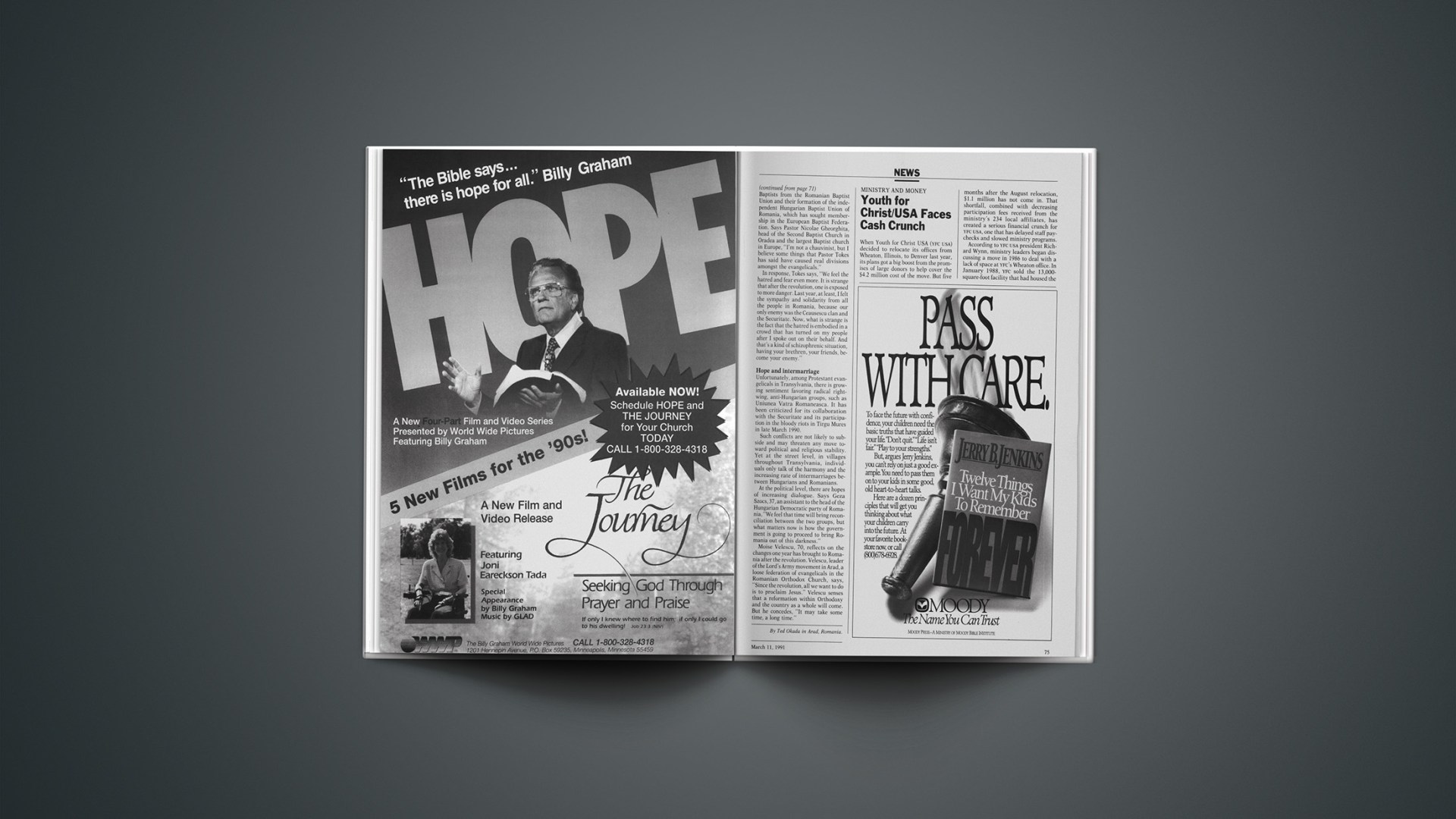When Youth for Christ USA (YFCUSA) decided to relocate its offices from Wheaton, Illinois, to Denver last year, its plans got a big boost from the promises of large donors to help cover the $4.2 million cost of the move. But five months after the August relocation, $1.1 million has not come in. That shortfall, combined with decreasing participation fees received from the ministry’s 234 local affiliates, has created a serious financial crunch for YFCUSA, one that has delayed staff paychecks and slowed ministry programs.
According to YFC USA president Richard Wynn, ministry leaders began discussing a move in 1986 to deal with a lack of space at YFC’s Wheaton office. In January 1988, YFC sold the 13,000-square-foot facility that had housed the organization’s headquarters since 1962 and began leasing back the facility until a new location was selected.
The move to Denver cost YFC $4,290,000, which was $100,000 more than the group anticipated, Wynn said. That figure includes $2.6 million spent for the 68,000-square-foot building, built for $7.6 million in 1978 and vacant since 1988.
The facility includes office space, a chapel, a training center, a conference room that can hold 400 people or serve meals to 250, and a video studio. Another $900,000 was spent on furniture and interior decorating, and $140,000 for relocation expenses, Wynn said.
Of the $4.2 million pledged for the move, $1.6 million has been received so far. Another $1.5 million has been pledged to come in over the next three years. Wynn blamed the unfulfilled pledges on economic hardship suffered by large donors. The shortfall also includes $200,000 in the form of an economic development grant from the state of Colorado that Wynn said he had expected, though no written agreement existed.
YFC must make three principal payments of $500,000 over the next three years to finish paying off the loan on the building. Wynn said that $200,000 of the next payment, due in May, is still needed.
Late Pay
Paychecks for some YFC employees have been late since July. Some checks for executive staff have been up to six weeks late, Wynn said. The ministry has caught up on its delinquent payments to suppliers in Denver and Wheaton. “The bulk of our accounts are in the 60-day range,” Wynn said.
In spite of the cash shortage, the organization has not cut back significantly on staff. Fifty employees work for YFC in Denver, compared to 52 in Wheaton. But other areas are feeling the pressure.
“We’ve cut back on travel for our headquarters staff and our eight regional field directors,” said Wynn. “And we have slowed down the timetable for implementing some of our new products and new ministry programs.”
There have also been attempts to bring in additional funds. In 1990 YFC launched “Campaign 9–1–1” in an attempt to raise funds for a video center, a national training center, and the move to Denver. The Campaign 9–1–1 goal is $15 million, of which $3,273,000 has been received in cash and $2,300,000 in pledges.
Wynn, however, remains bullish on the future. The ministry’s December fund-raising letter said nothing about a shortfall. “You will not find letters of panic going out of this office,” Wynn said. “We’re not that kind of communicators.”
Plans continue at full speed for DC ’91, the YFC-sponsored congress on youth evangelism, which is expected to draw 15,000 to 20,000 young people to the nation’s capital July 17–21. Sales are brisk for Stuck in a Nightmare: The Sean Sellers Story, the YFC/Gospel Films production that explores the dark life of a teenage Satanist who murdered his parents and then came to Christ on Oklahoma’s death row.
Fewer Students
According to some observers, the difficulties confronting YFC also are faced by other youth ministry groups and are due largely to sweeping demographic changes. Tom Gruen, vice-president of Christian Booksellers Association’s Center for Research and Information, said the “glory years” of youth ministries came in the seventies, but the student population has declined steadily since then. “Many organizations built infrastructures to support much larger demographic groups than are available now,” he says.
“The number of people these groups have to minister to has gone down, so the only way to sustain their levels of ministry is to reach a greater portion of the young people who are available. But at the same time, these kids have more things available to them than they ever had before.
“To further complicate things, the main source of money for these groups during their boom years was parents of kids, and for many parents there is no direct link anymore,” Gruen said.
New Ministries
Wynn said YFC is developing new alternatives to its traditional school campus ministries. “There are increasing numbers of kids who no longer go to school,” Wynn said, noting that up to 60 percent of the kids in some urban neighborhoods do not attend high school, while up to 50 percent do not attend junior high.
In order to fulfill its mission, Wynn said, YFC is now working at nearly 20 percent of the nation’s 1,093 juvenile facilities, and it is strengthening its outreach to suburbs, neighborhoods that include high-rise apartments, and shopping malls.
But YFC’s focus is still the same. According to Wynn, 22,000 decisions for Christ were made through YFC efforts during the past two years, compared with 14,000 annually for the five previous years.










